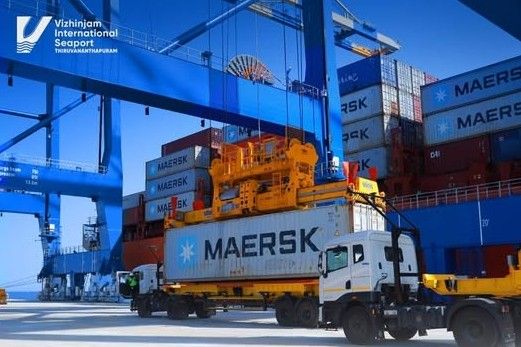
APSEZ eyes strategic Trucking Alliances as Vizhinjam Port gears up for Direct EXIM Cargo Handling
THIRUVANANTHPURAM : As Vizhinjam International Seaport prepares to launch full-fledged export-import (EXIM) operations by year-end, Adani Ports is actively exploring partnerships with nearly a dozen companies for road-based cargo transportation. These talks mark a significant shift for businesses currently dependent on feeder vessels via Colombo or Vizhinjam to reach ports along India’s eastern and western coasts.
With the new plan, direct cargo movement from Vizhinjam to Europe is on the horizon — a development that is particularly promising for industries such as automotive, textiles, retail, and general manufacturing. These sectors, which have long endured lengthy transshipment times, could soon benefit from faster, more streamlined logistics.
Once the port’s road connectivity to the national highway is completed — projected within three to four months — trucks will be able to transport containers directly from mother vessels to industrial zones across India. This infrastructure milestone is expected to significantly cut down transit times from the current 40–50 days to just 25 days or less for consignments bound for Europe or China.
In addition to saving valuable time, this direct routing could substantially lower logistics costs, especially for shipments of raw materials, components, and chemicals. The shift from feeder routes to road transport will also reduce cargo handling at intermediary ports, enhancing operational efficiency.
Industrial clusters in southern India are closely watching these developments, anticipating improved logistics and quicker turnaround times. While road infrastructure is nearing completion, the port’s rail connectivity is expected to take up to three more years. In the interim, Adani Ports estimates that 10–20% of Vizhinjam’s cargo could be EXIM-focused within the next three years.
Since the arrival of its first container vessel, San Fernando, on July 11, 2024, Vizhinjam Port has already handled 392 ships — including 23 ultra-large vessels — and processed 8.3 lakh containers. The port is currently capable of managing up to 10 lakh containers annually, with a long-term capacity goal of 62 lakh containers once future development phases are realized. Phase 2 expansion is scheduled to commence shortly, reinforcing the port’s role as a rising hub for international trade.

